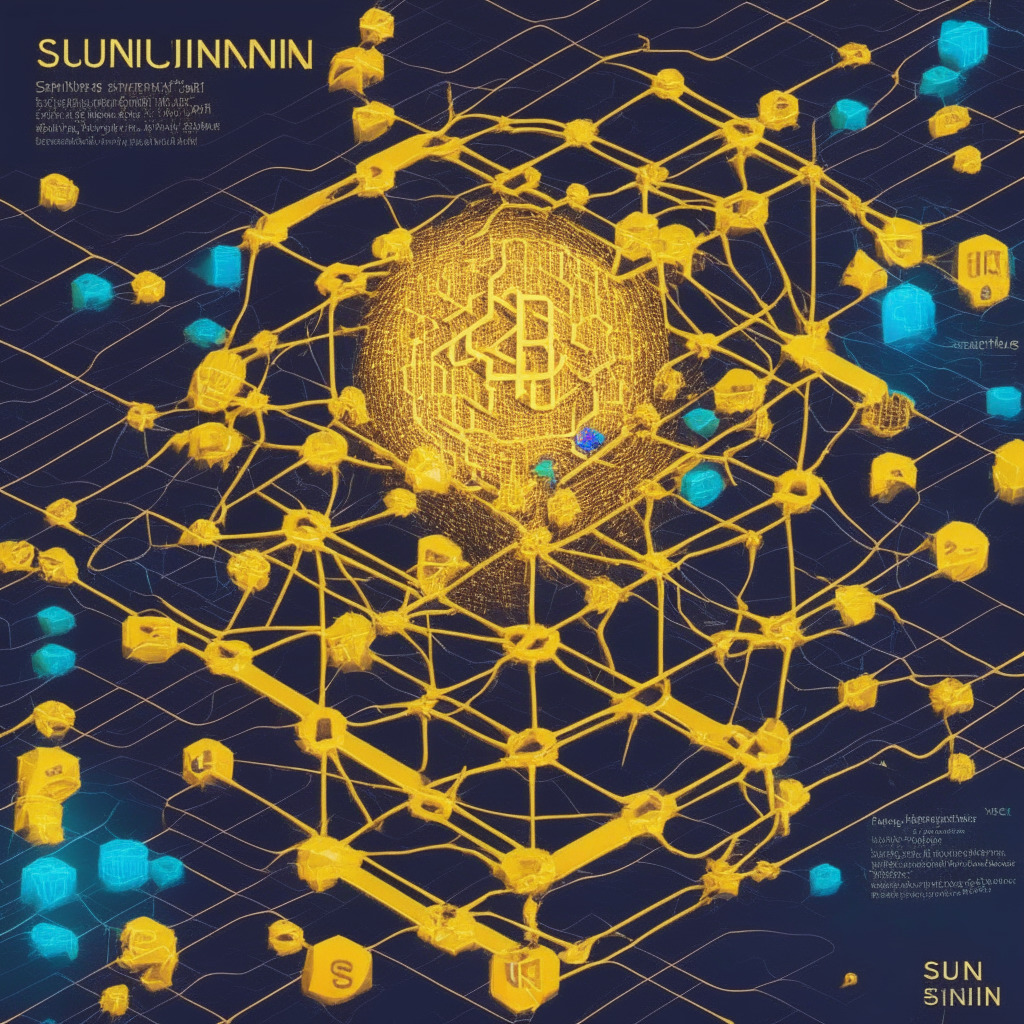Canton Network, a privacy-enabled interoperable blockchain, aims to streamline financial markets by creating a “network of networks” for asset synchronization. With support from Microsoft, Capgemini, Deloitte and others, it seeks to balance decentralization, privacy, and control for widespread adoption by financial institutions.
Search Results for: Sui Network
Crypto Tokens as Securities: Ripple Case Study, Arbitrum Dilemma, and Canton Network Prospects
The crypto world continues to debate whether tokens are securities in the US, as companies like Ripple battle costly lawsuits from the SEC. Meanwhile, projects like the Arbitrum Foundation push boundaries, despite concerns that revenue distribution might label their tokens as securities, and major corporations form coalitions to create institutional blockchain solutions.
Chia Network Enters Web3 Gaming: Facing Giants and Redefining the NFT Landscape
Chia Network launched the Chia Open Digital Economy (CODE) framework, aiming to empower an open metaverse of games and applications with interoperable assets. Chia announced a proof-of-concept trading card game, ChiaTCG, embracing Chia NFTs and turning them into playable cards, showcasing the potential of NFTs within gaming.
Binance Convert Adds SUI, FLOKI, PEPE: Convenient Trading Amid Meme Coin Volatility
Binance recently added SUI, FLOKI, and PEPE tokens to its Convert tool, allowing users to trade these new tokens with ease. This development follows a temporary suspension of market order functions for cryptocurrencies like SHIB, FLOKI, and PEPE due to high volatility. Caution is advised when trading meme coins.
Sui’s Entrance into Web3 Gaming: Unique Features Attract Game Developers & Revolutionize NFTs
Layer-1 blockchain network Sui enters the Web3 gaming ecosystem with unique capabilities, enabling parallel transaction processing, horizontal scaling, and dynamically-updated NFTs. Attracting over 40 games to build on it, Sui’s object-based model and gaming-oriented features offer developers an appealing alternative in blockchain-based gaming.
Exploring Sui: A Promising L1 Blockchain or an Overhyped Dud? Pros and Cons Unveiled
The new L1 proof-of-stake blockchain, Sui, developed by Mysten Labs, has generated buzz since its mainnet debut and SUI token listing. Despite some backlash and a fluctuating price, Sui’s market valuation stands at $709 million, raising questions about its future potential in the crypto sphere.
Ethereum Gas Fee Surge: Impact on Users and the Pursuit of Solutions
The Ethereum network is facing rapidly increasing gas consumption, with the median price of ETH gas reaching a 12-month high and average transaction fees surging to around $50. Factors such as high trading activity involving memecoins, escalating demand for transaction processing, and increased NFT trading are contributing to this alarming increase, making simple transactions expensive and challenging for decentralized application developers, traders, and retail investors.
Binance LaunchPools Frenzy: Sui Token Craze vs Regulatory Caution in Crypto Landscape
The Binance LaunchPools event, featuring Sui tokens, raised $300 million and saw a retail frenzy reaching $3.8 billion. Meanwhile, meme cryptocurrency PEPE’s market cap surpassed $550 million, highlighting hype-driven investments. As the crypto landscape evolves, striking a balance between enthusiasm, caution, and regulatory compliance is crucial.
BitMEX Lists PEPE and SUI Perpetual Contracts: Impact on Liquidity and Trading Opportunities
BitMEX announces listing of two new perpetual contracts, PEPE and SUI, offering traders exposure to the tokens with better liquidity and fewer network risks. By trading these listings, users can benefit from up to 50x leverage and high max position sizes, catering to both novice and seasoned traders.
Sui Blockchain Mainnet Launch: Advantages, Obstacles, and Implications for DeFi Future
Sui, a Layer-1 blockchain developed by Mysten Labs, has launched its mainnet, offering advanced technology with high-performance, sub-second finality, and rich on-chain assets. The platform promises scalability and accommodates numerous applications at low costs, using a Delegated Proof-of-Stake consensus mechanism. With over 200 decentralized applications prepared for deployment, Sui’s native token is already listed on prominent exchanges.
SUI Mainnet Launch: A Game Changer or Volatility Trap? Pros, Cons & Justin Sun’s Controversy
The SUI mainnet launch on May 3rd marks a significant milestone for the Sui Foundation, introducing a Layer 1 blockchain and smart contract platform with enhanced speed and scalability. Despite initial volatility and recent controversy, support from major exchanges signals potential, but investors must assess risks and rewards carefully.
Legal Battle: NY Attorney General vs. Celsius Network Founder – Unveiling the Crypto Risks
The New York State Attorney General filed a complaint against Celsius Network founder Alex Mashinsky, accusing him of defrauding investors and concealing the platform’s failing health. The legal battle highlights the importance of understanding crypto investment risks, regulatory challenges, and the necessity for regulatory bodies to adapt to the industry’s unique challenges.
SUI Token Launch: Mainnet Milestone or Risky Rapid Adoption?
The Sui Network’s mainnet launch, supported by major cryptocurrency exchanges like Binance and Huobi, marks a milestone for the Layer 1 blockchain striving to enhance Web3 adoption. Despite potential concerns over network security and centralization, Sui’s innovative delegated Proof-of-Stake system, substantial funding, and backing from Mysten Labs have garnered significant interest from investors and the crypto community.
Justin Sun’s $56M TUSD Transfer Ignites SUI Farming Debate: Apology & Binance CEO’s Warning
Tron founder and crypto entrepreneur Justin Sun has inadvertently ignited a debate about the ethics […]
Upgraded Litd Unleashes Non-Techies on Lightning Network: Friend or Foe to Bitcoin’s Scaling Solution?
Lightning Labs has recently upgraded Litd, enabling non-technical users to operate their own Lightning Network […]
Layer 1’s zkLogin: Bridging Social Media and Blockchain, but at What Risk?
“Sui Network has announced the integration of a Zero Knowledge Login (zkLogin) feature, allowing users to interact with decentralized applications (DApps) through their social media details. This approach aims to simplify DApps access, especially for users with limited knowledge on ‘web3’.”
Easing Crypto Entry: The Struggle for Streamlined Onboarding While Retaining Security in Blockchain Applications
Sui Network has integrated Google, Facebook, and Twitch logins into its DApps (decentralized applications), aiming to streamline the onboarding process on Web3 and eliminate the need for managing an external crypto wallet. The new zkLogin (Zero Knowledge login) feature ensures user privacy and security, essential characteristics in Blockchain applications.
Revolutionizing Sports: Red Bull Racing’s Blockchain Partnerships & What It Means for the Industry
Red Bull Formula One Racing and Mysten Labs-backed Sui network announce a multiyear partnership, aiming to offer globally available digital experiences through blockchain technology. The collaboration follows Red Bull Racing’s $150 million sponsorship agreement with crypto exchange Bybit, highlighting blockchain’s potential to revolutionize traditional industry practices in sports.
Google’s Embrace of NFT Games: A Leap Forward or a Double-Edged Sword?
Google Play Store’s recent decision to permit NFT games is a testament to blockchain’s growing acceptance. However, Google restricts the inclusion of gambling elements in these games. Even as NFT games redefine the digital world, policies, layoffs and burgeoning transactions highlight both the potential and uncertainties of NFTs.
Crypto Meets Formula 1: Mysten Labs’ Impact on Racing and Fan Engagement
Web3 infrastructure firm Mysten Labs partners with Red Bull Racing, introducing blockchain technology into Formula 1. This collaboration enables fan engagement through staked tokens and showcases the growing influence of crypto and Web3 in the sports industry.
Binance Expands Meme Coin Support: Boosting Market or Undermining Crypto Viability?
Binance expands support for meme coins PEPE and SUI by introducing new isolated margin pairs and UMA as a borrowable asset, boosting their prices. Despite increased interest in meme coins, critics question their long-term viability arguing they undermine the broader blockchain and cryptocurrency industry.
Meme Coin Rally Falters: Examining PEPE’s Decline and the Impact of Token Allocations
The meme coin rally, including Pepecoin (PEPE), appears to be losing momentum as PEPE’s value drops 11%. Despite this, the coin experienced a 215% increase over the past week. Factors like market makers’ token allocation and selling pressures raise concerns for investors, highlighting the need for caution and awareness of potential risks.
Rising Blockchain Competitors Threaten Solana’s Dominance: Can It Stay Ahead?
Six new blockchain networks are set to launch soon, intensifying competition in the blockchain ecosystem. Despite the highly competitive landscape, Solana Labs founder Anatoly Yakovenko remains confident in Solana’s technical strengths, such as speed, higher transaction numbers, and more nodes. However, the influx of capital into new projects could cut into Solana’s market share, necessitating adaptation and innovation.
UK Watchdog Blocks Crypto Ads: A Blow for Binance’s Marketing Plans or a Step Towards Regulatory Compliance?
“The Financial Conduct Authority (FCA) has put restrictions on Rebuildingsociety, a peer-to-peer lending platform partnered with Binance, inhibiting it from issuing crypto ads due to non-compliance with new marketing regulations. This change creates uncertainties and affects the platform’s ability to facilitate Binance’s visibility in the UK market.”
Navigating the Cryptostorm: The Rise and Fall of Binance’s Billion-Dollar Recovery Initiative
“Binance’s ambitious Industry Recovery Initiative (IRI), a billion-dollar fund to rescue struggling cryptocurrency startups, has under-delivered. Only $15 million of the declared $1 billion has been deployed amidst regulatory pressures and lack of suitable investment opportunities. However, the initiative retains its significance in the volatile cryptocurrency ecosystem.”
Ethereum Decline: Diving into the Factors Behind ETH’s Recent Dip
“The recent 8.2% decline in Ethereum (ETH) attributes to increased coin issuance, significant sales by creator Vitalik Buterin, and the underperforming ETH futures ETF. Despite significant network developments, the uncertainty of Ethereum’s monetary policy and increased supply by 30,064 ETH has stirred negative sentiments among crypto enthusiasts.”
Unraveling the Complex Quest for Australia’s Digital Currency: CBDC Exploration and Challenges
The US-based Atlantic Council think tank reported that over half of 130 countries are piloting or launching central bank-issued digital currencies (CBDCs). However, Australia’s journey toward an Aussie digital currency (eAUD) faces complexities, including legal, regulatory, and operational challenges, despite progress made by Blockchain firm Canvas.
Achieving Finality in Blockchain: Irrevocable Transactions, Challenges and Future Prospects
“Finality in blockchain refers to the irrevocable confirmation of a transaction or block of transactions. Achieving finality has challenges like network latency and potential 51% attacks. However, improved security algorithms, consensus algorithms and advanced cryptographic techniques promise faster, more reliable confirmations, and permanence of transactions.”
Social Media Platform X, XRP Fiasco, and the Trend Shift in Crypto-Dynamics
“Elon Musk’s platform X is under criticism for suspending an XRP-focused account, raising questions of censorship. Meanwhile, XRP’s disputed past, including a lawsuit from SEC, remains a potential influencing factor. Amidst these, the platform aims for multiservice extension while an SEC investigation into Musk occurs. These instances indicate a shift in crypto and social media dynamics.”
EU’s New Crypto Regulatory Outlook: Balancing Sustainability, Transparency, and Market Growth
ESMA’s latest consultation paper on Markets in Crypto Asset regulation aims at integrating the crypto market by 2024, focusing on sustainability, consistency in crypto services, transparency in pre, and post-trade data, record-keeping by CASPs and accessible white papers. The initiative stresses environmental sustainability, encourages business continuity policies, and emphasizes real-time transparency in transactions.
PayPal’s PYUSD Stablecoin: Welcomed Asset or Threat to Tether’s Predominance?
Tether co-founder, William Quigley, in a recent interview expressed skepticism towards the acceptance of PayPal’s impending stablecoin. Highlighting that cryptocurrencies earn credibility over time, he outlined that new entrant, PayPal, would face challenges in gaining trust and performance reputation among crypto users. He flagged significant regulatory challenges and the high cost of compliance as potential hurdles for PayPal’s stablecoin.
Harnessing Digital Yuan and Hong Kong’s FPS: A Leap Towards International Financial Synchronization or Concern for Economic Autonomy?
The digital currency research division of People’s Bank of China (PBoC) has interlinked its CBDC platform with Hong Kong’s Fast Payment System (FPS), to expedite cross-border digital yuan transactions and enhance system compatibility with international payment networks. However, this convergence of global currency networks may risk homogenizing diverse economic systems.































